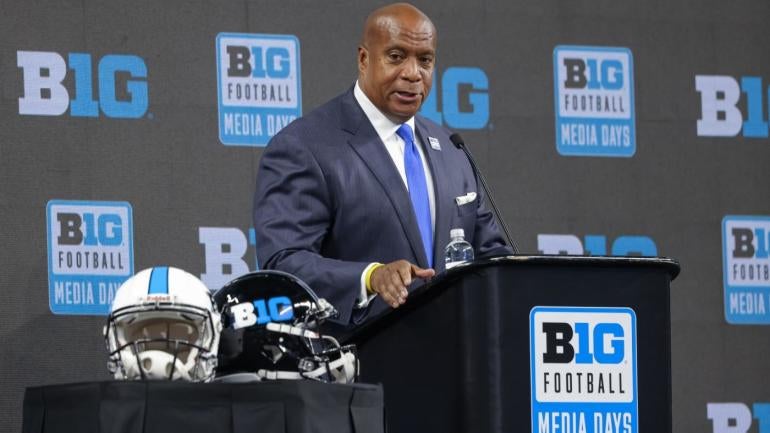
On the heels of its landscape-altering addition of UCLA and USC, the Big Ten's leadership is not closing the door on the possibility of additional expansion. Commissioner Kevin Warren said Tuesday at Big Ten Media Days that he gets asked "every single day" what's next in regards to conference realignment, and he said it "may" include future expansion.
"But it will be done for the right reasons at the right time with our student-athletes, academic and athletic empowerment at the center of any and all decisions that we will make regarding any further expansions," Warren said. "We will not expand just to expand. It will be strategic, it will add additional value to our conference, and it will provide a platform to even have our student-athletes be put on a larger platform so they can build their careers but also that they have an opportunity to grow and learn from an education and from an athletic standpoint."
The additions of UCLA and USC, effective for the 2024 football season, will bring the Big Ten to 16 teams, which will be on par with the size of the SEC following its addition of Oklahoma and Texas. The move makes the Big Ten the first major conference in college sports to have schools in both the Pacific and Eastern time zones. While the league's sprawling geography will present logistical challenges with scheduling, Warren made it clear he sees a coast-to-coast footprint as an advantage, especially in terms of content distribution.
"I think the value of being across four time zones for multiple reasons is really important," Warren said. "We haven't finalized the financial impact, and ironically this probably will shock you: the numbers and finances associated with it are typically the last thing that I kind of consider and analyze. It's important for me from a business standpoint, but from a decision-making process standpoint, always look at all the other reasons why, because if all the other reasons make sense, the finances will take care of themselves."
Securing two of the West Coast's top collegiate brands in advance of the Big Ten's new media rights deal potentially opens the league up to capitalize on the late-night TV window, giving the league four TV slots each Saturday instead of the traditional three. Warren said the league is "finalizing our deals" and added that he expects an announcement "sooner than later" on a new media rights deal that is expected to be in the neighborhood of $1 billion annually.
As for the cut that its new schools will receive, Warren said UCLA and USC will enter the league as full members.
"We think that's important for various reasons," Warren said. "They bring a lot of value to our relationship. They bring a lot...to our relationship, and we look forward to welcoming them into the Big Ten family here in 2024. There's a lot of work to be done between now and then."
















